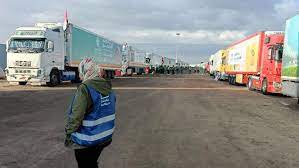

Egypt has agreed to allow aid trucks into Gaza, offering a glimmer of hope to the beleaguered region amidst rising global condemnation of Israel’s ongoing siege. The decision was revealed by United States President Joe Biden, who announced that his Egyptian counterpart Abdel Fattah el-Sisi had agreed to open the Rafah crossing into Gaza specifically for humanitarian aid, making it the only crossing not controlled by Israel.
According to President Biden, up to 20 trucks from a waiting aid convoy will be permitted entry into Gaza, but the roads near the crossing, marred by Israeli airstrikes, need repairs before the aid can be delivered. The repairs are slated to occur over eight hours on Thursday, with aid deliveries scheduled for Friday.
The move comes in response to relentless bombardment by Israel, which has triggered widespread protests across the Middle East and raised concerns about the potential escalation of the conflict into a broader regional crisis.
UN Deputy Spokesperson Farhan Haq stated, “We’re negotiating with the parties to make sure that we can get humanitarian goods going in, and right now, we’re in the process of those negotiations. We’re trying to get them in as soon as we can.”
However, the impact of this aid delivery remains uncertain, given the dire humanitarian situation in Gaza. The World Health Organization has declared the crisis as spiraling out of control, affecting hundreds of thousands of people. Richard Brennan, the regional WHO representative, emphasized the complexities of the aid operation, stating, “This is not a sprint. This is just the start. This is a marathon. An absolute marathon,” with the goal being to distribute up to 100 trucks of aid daily.
President Biden clarified that the Rafah crossing would solely be open for aid, ruling out evacuations. This decision leaves an uncertain fate for the 2.2 million Palestinians in Gaza, including foreign nationals and dual citizens, who have no way out of the conflict zone.
Amidst near-constant airstrikes, hospitals in Gaza are overwhelmed, running out of essential supplies and struggling to save lives. UN agencies have warned that food stores are on the verge of depletion, and Gaza’s last seawater desalination plant has shut down, heightening the risk of further fatalities, dehydration, and waterborne diseases.
more recommended stories
 New Director Appointed: Burao Hospital’s Fall and the Fight for Revival
New Director Appointed: Burao Hospital’s Fall and the Fight for RevivalBurao Hospital begins a new chapter.
 Somaliland: While Mogadishu Burns, Somalia Seeks Chaos in Sool
Somaliland: While Mogadishu Burns, Somalia Seeks Chaos in SoolHargeisa, April 9, 2025 – (Somaliland.com).
 Somaliland Presidency Delivers 10 Vital Dialysis Machines to Hargeisa Group Hospital
Somaliland Presidency Delivers 10 Vital Dialysis Machines to Hargeisa Group HospitalHargeisa – Somaliland – The President.
 Electricity Without Accountability: Public Outrage Grows in Burao Electricity Debate
Electricity Without Accountability: Public Outrage Grows in Burao Electricity DebateHigh electricity costs in Burao have.

